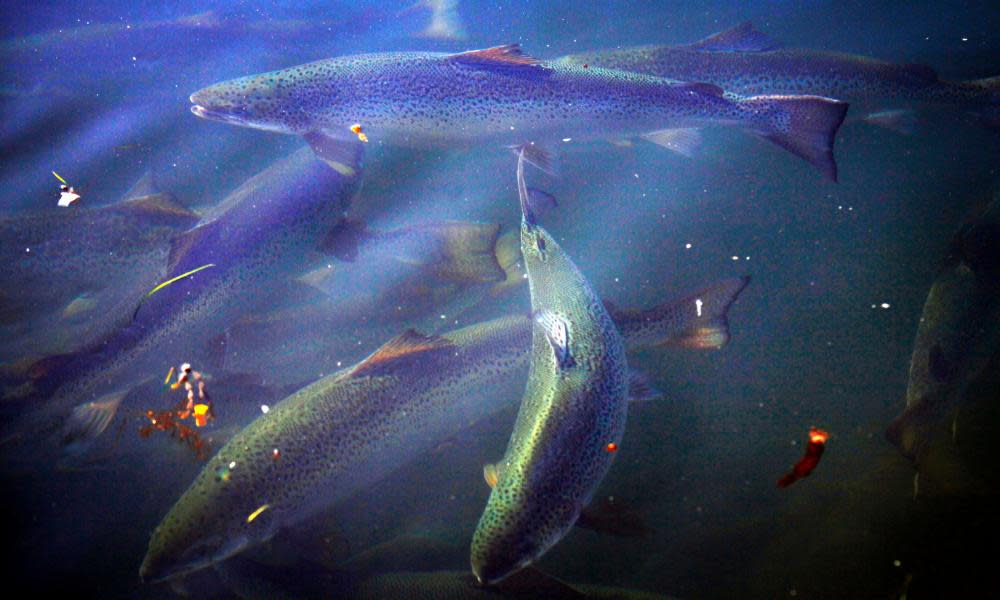Tasmanian salmon should be off the menu for now, says conservation group

It’s one of Australia’s – and the world’s – favourite fish but Tasmanian Atlantic salmon should be off the menu for now, according to the Australian Marine Conservation Society, publishers of Australia’s independent sustainable seafood guide.
On Wednesday, the AMCS downgraded the farmed fish’s rating from an amber “Think Twice” to a red “Say No” due to ongoing environmental concerns. The previous review was in 2015.
Adrian Meder, the sustainable seafood program manager at AMCS, said the salmon farming industry had been enabled to expand “too far and too fast” in Macquarie Harbour, on the state’s west coast, where key players Huon Aquaculture, Tassal and Petuna lease several industrial fish pens.
“We are supportive of sustainable aquaculture and this is an important source of seafood for Australia in the future, but it needs to be done within the bounds of which an environment can support,” Meder said.
He said the assessment was based on reported environmental impacts, including the dramatic falls in oxygen levels in the harbour that created dead zones on the seafloor, the loss of industry certification by key players Tassal and Petuna and the death of 1.35 million fish from pilchard orthomyxovirus, POMV, a disease exacerbated by environmental stress. “If the salmon is running out of oxygen, so is everything else.”
There were additional concerns around the industry’s detrimental impact on the rare and endangered Maugean skate fish and poor interactions with Australian fur seals.
“Those sorts of impacts are clear and indisputable signals that environment has been pushed too hard,” Meder said.
He said the group is also deeply concerned with the industry’s plans to expand into Storm Bay and Okehampton Bay in south-east Tasmania.
According to the latest figures published by the Tasmanian Salmonid Growers Association, the salmon farming industry is worth $1.12bn, and provides almost 3,000 jobs, directly or in support, in the state.
In a statement, TSGA’s chief executive, Dr Adam Main, said the industry was “deeply concerned at the misinformed and irresponsible assessment made by the Australian Marine Conservation Society”.
Main said the assessment failed to take into account improvements and investments made in infrastructure, environmental programs and biosecurity protocols, by all three companies within the last 12 months.
“This includes substantial investments into seal-proof infrastructure across companies, to the tune of more than $160m between them; investments into multi-trophic farming to reduce environmental impacts and substantial funding of marine debris partnerships to further reduce impacts in waterways.”
Meder agreed the industry had improved recently but said they were yet to see the environmental impacts.
Although a recent report by the Institute of Marine and Antarctic Studies found that dissolved oxygen levels in the middle and bottom waters of the harbour had improved due to favourable weather conditions and lower river flows over the last eight months, there had been little change to the low levels of fish recorded in the harbour in previous surveys.
Main also claimed that AMCS had been invited by industry to visit in the last five years “to no avail.” Meder said he visited in June and met with representatives from two of the three companies, although he wouldn’t name the companies.
Meder said many of the issues had arisen because of a lack of government regulation. “We’ve seen some changes to regulation of the industry but certainly experts we trust still have serious concerns about the true independence of that regulation.”
When the downgrading was announced on Wednesday, independent MP Andrew Wilkie said in a statement that it was “further evidence that the industry urgently needs to clean up its act”.
On Friday he said the aquaculture industry needed to be “genuinely sustainable” because of its importance to Tasmania. “If it doesn’t, it will go the way of forestry and it will be Tasmanians, particularly those in regional areas, who will suffer.”
According to a statement from the Tasmanian government: “The Australian Marine Conservation Society is simply doing the bidding of the anti-industry Greens.
“Tasmania has a sustainable salmon industry, and we have strengthened regulations and increased penalties for those organisations not abiding by the stringent rules.”
The Tasmanian premier, Will Hodgman, is currently overseeing the primary industries portfolio after minister Sarah Courtney stepped down earlier this week. The shadow minister for primary industries, fisheries and water, Shane Broad, was contacted for comment.
Meter said the AMCS would be open to reconsidering the assessment once the environment improved. “We want an industry as large as this one to be rating green in future.”


